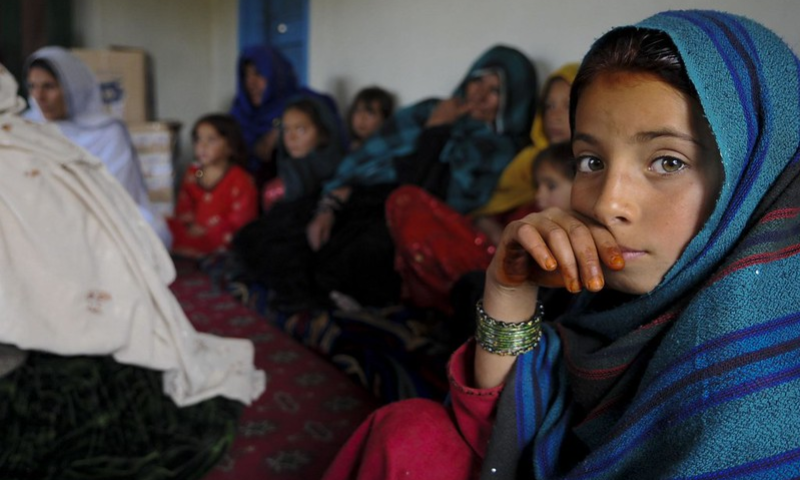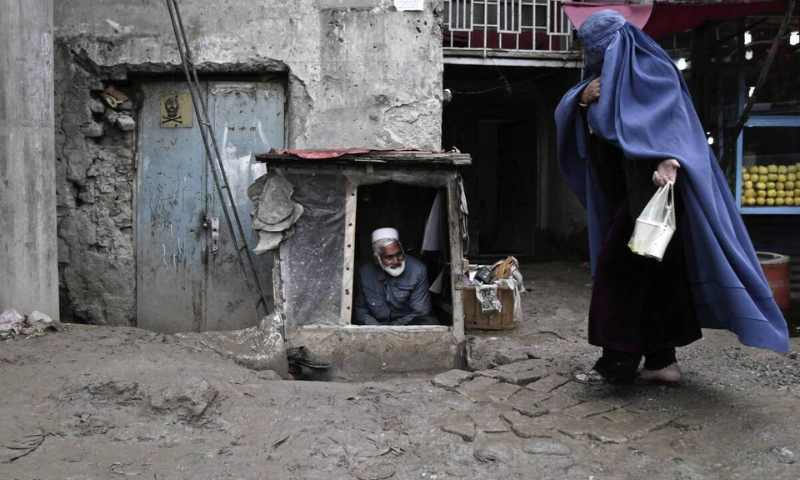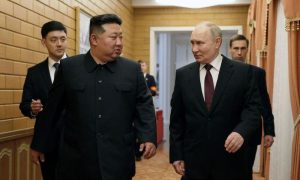“Give me good mothers, I will give you a good nation.” This quote from Napoleon Bonaparte encapsulates the fundamental role of women in shaping societies. Unfortunately, women’s ability to make a significant contribution to Afghanistan has been severely limited, especially after the Taliban return to power in 2021. The Taliban commenced a systematic and methodical effort to violate women’s rights on an unprecedented scale with this incident. Afghanistan’s women’s situation is shown in a bleak light in the recently released United Nations Afghanistan Gender Profile, which emphasises how the gains that were made between 2001 and 2021 have been reversed, returning women to conditions that are reminiscent of centuries before. Women’s liberties and rights have not only been severely restricted but have been completely eradicated under the Taliban’s organised framework and policies. Women’s rights have been so thoroughly attacked by the Taliban that they hardly play any part in society anymore. Afghanistan is facing several problems at the moment, including political, environmental, humanitarian, and economic ones, but women are the group most negatively impacted by these grave circumstances.
The Convention on the Elimination of All Forms of Discrimination Against Women (CEDAW) is one of the international human rights treaties that Afghanistan has ratified, and it is flagrantly violated by the Taliban as the de facto authority. Systematic violence and discrimination based on gender have become the norm under this terrifying dictatorship. Every facet of life is severely restricted for women and girls, including rights related to work, political engagement, health care, and education, as well as freedoms of expression, peaceful assembly, and mobility. Presently, Afghanistan is alone among nations in the world in prohibiting girls from pursuing secondary and higher education, resulting in an atmosphere of seclusion and suffocation that many compare to a prison-like setting. Holders of UN mandates have pointed out emphatically that Afghanistan has witnessed the most pervasive, systematic, and comprehensive onslaught on women’s and girls’ rights of any nation in the world. The ICJ (International Court of Justice), provides an opportunity for Afghan women to raise their voices and seek justice and responsibility. Afghanistan has consented to the ICJ’s jurisdiction over matters pertaining to the interpretation and implementation of CEDAW. As a result, Afghanistan’s compliance with the Convention may be contested in court by any state party agreeing to the International Court of Justice’s jurisdiction under the Convention on the Elimination of All Women. In a June 2023 UN report, the Working Group on Discrimination Against Women and Girls and the Special Rapporteur for Afghanistan encouraged governments to assist Afghan women and girls in their quest for justice through the International Court of Justice (ICJ). It is possible to pursue this legal path in spite of the difficulties, and it may have a big influence on the rights of women and girls in Afghanistan.
The rules of the Taliban significantly impede women’s and girls’ freedom of movement, which therefore restricts their access to jobs and educational institutions. Women are silent and helpless as a result of their absence from public life and decision-making processes at all levels, including home, community, provincial, and national.
The hostile and constrictive atmosphere produced by the Taliban presents enormous hurdles to international organisations working to help women in Afghanistan. The UN has demanded that the Taliban subsidise groups that promote the rights of women and set aside 30% of Afghanistan’s budget for the safety and well-being of women. That Afghanistan is ranked worst on the Women’s Peace and Security Index, however, is a testament to the Taliban’s persistent disdain for these pleas. Afghan women’s literacy rates have risen significantly from 17 percent in 2001 to 30 percent in recent years, which is indicative of the efforts taken to support women’s education. But since 2021, there has been a notable increase in the number of female suicides; 18% of women haven’t left their houses in the previous three months. The Taliban’s harsh policies, which have driven 100,000 women out of higher education and 1.1 million girls out of school, are directly to blame for this worrying trend.
There are significant differences between Afghanistan and other nations when comparing data on women’s empowerment. For example, female literacy rates are about 30% in Afghanistan and almost 100% in industrialised nations like Norway and Sweden. Women’s employment rates in Afghanistan are less than 20%, but they are above 70% in nations like Germany and Canada. Similar disparities exist in political engagement; in Afghanistan, women have fewer than 5% of parliamentary seats, whereas in Rwanda, they hold over 40%. As the primary carers and educators, mothers play a crucial role in raising balanced generations by nurturing intellectual and emotional development and imparting values. This position is undermined in Afghanistan by the structural subjugation of women, which results in societal stagnation and the continuation of cycles of poverty and instability.
The plight of Afghan women under Taliban rule is a human rights crisis of immense proportions. Women’s rights have been consistently violated, pushing them to the periphery of society and robbing them of their autonomy and dignity. In order to guarantee that Afghan women’s opinions are heard and their rights are upheld, the international community must keep fighting for their rights. There is only hope for a future in which Afghan women may live free and with dignity, reclaiming their proper position in society as inscribed in the teachings of Islam. The international community needs to assert perpetual efforts in elevating women’s deplorable situation in Afghanistan.
















![Pakistan is encountering dreadful terrorism and extremism. The government needs to revisit and reconstitute its counterterrorism strategy, which is grounded on popular support guaranteed through consensus in Parliament. Besides, an objective political dialogue among the political parties is the need of the hour for internal political stability and engaging the masses to quash effectively terrorist popular and physical sanctuaries. Indeed, without a consensus among the political parties over the launch of Operation Azm-e-Istehkam to combat the menace of terrorism in the country, it could be counterproductive. Since the United States-led NATO withdrawal from Afghanistan in August 2021, terrorist activities have increased rapidly in the country. The foreign-sponsored terrorist groups are targeting and killing law enforcement agencies' personnel, kidnapping and butchering innocent citizens and killing foreigners, especially Chinese, to spoil and thwart foreign direct investment in the country. Realizing the urgency, the government has initiated a new military operation to combat terrorism and extremism. On June 22, the Central Apex Committee of National Action Plan, chaired by Prime Minister Shehbaz Sharif, approved "Operation Azm-e-Istehkam" to eliminate terrorism and extremism nationwide. The presence of Federal Cabinet members, Chief ministers from all provinces and Gilgit-Baltistan, services chiefs, provincial chief secretaries, and other senior civilian, military, and law enforcement officials in the meeting reveal all the stakeholder's unanimity to reinvigorate and re-energize national counterterrorism campaign through the launch of Operation Azm-i-Istehkam. Operation Azm-e-Istehkam is a multipronged strategy with kinetic and non-kinetic stratagems, i.e., military, diplomatic, legislative, and socioeconomic plans to decisively defeat terrorism and extremism. "Azm-i-Istehkam will integrate and synergize multiple lines of effort to combat the menaces of extremism and terrorism comprehensively and decisively." The Pakistan Army has been bravely fighting with the terrorists since the 2009 Swat operation, but the diplomatic tier of the counterterrorism strategy was less effective. Operation Azm-e-Istehkam drives Islamabad to approach diplomatically likeminded states and coordinate with Shanghai Cooperation Organization’s Regional Anti-Terrorist Structure (RATS) to terminate the foreign financial and material support to terrorist groups such as Taliban (TTP), Balochistan Liberation Army (BLA), Daish (Islamic State Khorasan) involved in the terrorist attacks in the country. The Operation Azm-e-Istehkam is the need of the hour. Ironically, even before the launch of the operation, it received a divisive response from the parliamentarians due to the extreme polarization in the Pakistani polity. Pakistan Tehreek-e-Insaf members fiercely opposed the operation’s starting without the prior approval of the Parliament. The PTI Chairman Barrister Gohar said, "Any military operation must involve parliamentary consent. Parliament is supreme under the Constitution." In the parliamentary system of government, like the Pakistani political system, if the Cabinet approves any policy, including military operations, it is assumed that the majority in the Assembly endorses the decision. However, the opposition can call an in-camera session in the Parliament, even over sensitive issues. Defense Minister Khawaja Asif, instead of pacifying opposition lawmakers through dialogue or engagement, reacted viciously on the floor of the National Assembly. He said, “They (the opposition) are standing with the terrorists by protesting here today. They are protesting against the martyrs of the Pakistan Army and the army that is still making sacrifices to [counter] terrorism. They have not backed off from their May 9 stance even today.” Such a response to the PTI lawmakers in the National Assembly, particularly by the Defense Minister, increases disharmony and divisiveness in the Pakistani polity and negatively affects the operation. However, later, rationality prevailed, and Khawaja Asif said that the decision to conduct the operation would go "through the process," including a debate in Parliament’s in-camera session. He said, "It will go through the cabinet, then it will be presented in the House, and the House would be briefed.” One can expect a similar prudent response from the PTI leadership within and outside the Parliament. However, the statements of the PTI leaders are not encouraging. PTI leader Qaiser said, "Our belief is that a military operation is not the solution. All political parties must play their role to establish peace in the province." He is ignoring the fact that the battle-hardened foreign sponsored terrorist groups necessitate kinetic action. In the present pessimistic political situation, Pakistan Peoples Party chairman Bilawal Bhutto-Zardari’s visionary recommendation has germinated optimism. On June 21, he drew attention to the cardinal cause of the internal insecurity: “The politics of hatred in Islamabad is at its peak.” He rightly called for a dialogue among all democratic forces to take the country out of the crisis. He said, "There're many leaders who're not even ready to talk. They don't want to even shake hands with each other. I urge them all once again that all political parties, whether they're in the government or opposition, initiate dialogue with all political forces. Don't let your ego or personal issues dominate this process. If you want to bring Pakistan out of economic crisis and strengthen the Parliament, you would have to talk to democratic forces." Indeed, the country's stability is out of the question without swapping enmity with amity among the political forces. Thus, the political leaders, especially PML-N and PTI, should listen to Mr. Bilawal and initiate a respectful and civilized discussion to steer the country out of the numerous crises, including extremism and militancy. To conclude, a consensual national strategy to combat the menace of terrorism is impossible without recuperating the tumultuous landscape of Pakistani politics. Indeed, the government is responsible for engaging the opposition on the national security issue. Conversely, the opposition party realizes its duty to provide an alternative vision and policy instead of adopting a rejectionist approach.](https://wenewsenglish.pk/wp-content/uploads/2024/06/apex-2-300x180.jpg)








